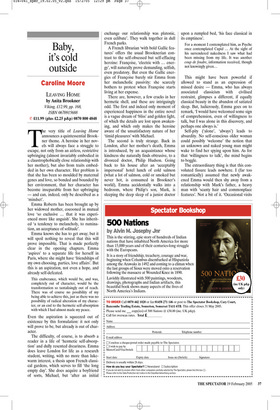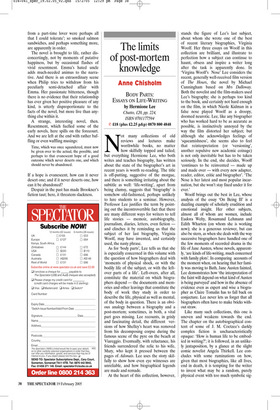Baby, it’s cold outside
Caroline Moore
LEAVING HOME by Anita Brookner Viking, £12.99, pp. 168, ISBN 0670915688 V £11.99 (plus £2.25 p&p) 0870 800 4848 The very title of Leaving Home announces a quintessential Brookner theme. A heroine in her novels will always face a struggle to escape, not only from an airless, restrictive upbringing (almost invariably embodied in a claustrophobically close relationship with her mother), but also from traits embedded in her own character. Her problem is that she has been so moulded by maternal genes and love, so bonded and bounded by her environment, that her character has become inseparable from her upbringing — and can, indeed, only be described as a ‘mindset’.
Emma Roberts has been brought up by her widowed mother, cocooned in mutual love ‘so exclusive ... that it was experienced more like anguish’. She has inherited ‘a tendency to melancholy, to rumination, an acceptance of solitude’.
Emma knows she has to get away; but it will spoil nothing to reveal that this will prove impossible. That is made perfectly clear in the opening chapters. Emma ‘aspires’ to a separate life for herself in Paris, where she might have ‘friendships of my own choosing, parties, love affairs’. But this is an aspiration, not even a hope, and already self-defeated.
This exuberance, which would be, and was, completely out of character, would be the transformation so tantalisingly out of reach. There was of course no possibility of my being able to achieve this, just as there was no possibility of radical alteration of my character, or an end to the hermetic self-absorption with which I had almost made my peace.
Even the aspiration is squeezed out of existence by this formulation: it not only will prove to be, but already is out of character.
The difficulty, of course, is to absorb a reader in a life of ‘hermetic self-absorption’ and dully resented dreariness. Emma does leave London for life as a research student, writing, with no more than lukewarm interest, a thesis upon French classical gardens, which serves to fill ‘the long empty day’. She does acquire a boyfriend of sorts, Michael, but ‘after an initial exchange our relationship was platonic, even celibate’. They walk together in dull French parks.
A French librarian ‘with bold Gallic features’ offers the usual Brooknerian contrast to the self-obsessed but self-effacing heroine: Françoise, ‘electric with ... energy’, will naturally prove demanding, selfish, even predatory. But even the Gallic energies of Françoise barely stir Emma from her melancholic passivity: she scarcely bothers to protest when Françoise starts living at her expense.
There are, however, a few cracks in her hermetic shell, and these are intriguingly odd. The first and indeed only moment of experienced happiness in the entire novel is a vague dream of ‘bliss’ and golden light, of which the details are lost upon awakening, and which only makes the heroine aware of the unsatisfactory nature of her ‘timid pleasures’ with Michael.
The second is truly strange. Back in London, after her mother’s death, Emma is introduced, by an acquaintance whose kindness she naturally finds obtrusive, to a divorced doctor, Philip Hudson. Going back to his house after an ‘acceptably impersonal’ hotel lunch of cold salmon (what a lot of salmon, cold or smoked but never hot, is consumed in Brookner’s world), Emma accidentally walks into a bedroom, where Philip’s son, Mark, is sleeping the deep sleep of a junior doctor upon a rumpled bed, ‘his face classical in its emptiness’.
For a moment I contemplated him, as Psyche once contemplated Cupid ... At the sight of his surrendered nakedness I saw what had been missing from my life. It was another coup de foudre, information received, though not knowingly given...
This might have been powerful if allowed to stand as an expression of missed desire — Emma, who has always associated classicism with civilised restraint, glimpses a different, if equally classical beauty in the abandon of satiated sleep. But, ludicrously, Emma goes on to remark, ‘I would have welcomed some sign of comprehension, even of willingness to talk, but I was alone in this discovery, and perhaps one always is.’ Self-pity (‘alone’, ‘always’) leads to absurdity. No self-conscious older woman could possibly ‘welcome’ the notion that an unknown and naked young man might wake to find her spying upon him. As for that ‘willingness to talk’, the mind begins to boggle.
The extraordinary thing is that this convoluted fissure leads nowhere. I (far too romantically) assumed that newly awakened Emma would then shy away from a relationship with Mark’s father, a heavy man with ‘scanty hair and commonplace features’. Not a bit of it. ‘Occasional visits from a part-time lover were perhaps all that I could tolerate’; so smoked salmon sandwiches, and perhaps something more, are apparently in order.
The novel is brought to life, rather disconcertingly, not by moments of putative happiness, but by occasional flashes of vivid resentment. Emma’s hated uncle adds much-needed animus to the narrative. And there is an extraordinary scene when Philip tries to withdraw from his peculiarly semi-detached affair with Emma. Her passionate bitterness, though there is no evidence that their relationship has ever given her positive pleasure of any kind, is utterly disproportionate to the facts of the novel, but more live than anything else within it.
A strange, interesting novel, then. Resentment, which fuelled some of the early novels, here spills on the forecourt. And we are left at the end with rather baffling or even waffling musings:
Time, which was once squandered, must now be given over to the actual, the possible, and perhaps to that evanescent hope of a good outcome which never deserts one, and which should never be abandoned.
If a hope is evanescent, how can it never desert one; and if it never deserts one, how can it be abandoned?
Despair in the past has made Brookner’s fiction taut; here, it threatens slackness.


















































 Previous page
Previous page